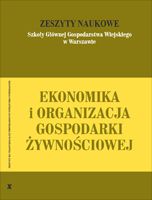Main Article Content
Article Details
„Annut und soziale Ausgrenzung in der EU nach Laeken Teil 1", Statistik kurz gefasst. Bevolkerung und soziale Bedingungen, THEMA 3 - 8/2003, Eurostat 2003.
„Annut und soziale Ausgrenzung in der EU nach Laeken Teil 2", Statistik kurz gefasst. Bevolkerung und soziale Bedingungen, THEMA 3 - 9/2003, Eurostat 2003.
Commission of the European Communities; Commission Staff Working Paper, Social Inclusion in the New Member States, A Synthesis of the Joint Memoranda on Social Inclusion; Brussels, 22.6.2004 SEC (2004)848.
Narodowa Strategia Integracji Społecznej dla Polski - dokument przygotowany przez Zespół Zadaniowy do spraw Reintegracji Społecznej, któremu przewodniczył Minister Gospodarki, Pracy i Polityki Społecznej Jerzy Hausner.
STAŃKO A. 2003. Wykluczenie społeczne i sfera ubóstwa w krajach Unii Europejskiej. Zeszyty Naukowe SGGW, Ekonomika i Organizacja Gospodarki Żywnościowej, (50). (Crossref)
Downloads
- Marcin Idzik, Aneta Stańko, Ekonomiczne uwarunkowania oraz tendencje zachowań konsumentów na rynku dóbr FMCG , Zeszyty Naukowe SGGW - Ekonomika i Organizacja Gospodarki Żywnościowej: Nr 59 (2006)
- Maria Zajączkowska, Aneta Stańko, Sfera ubóstwa w Polsce w latach 1994-2000 , Zeszyty Naukowe SGGW - Ekonomika i Organizacja Gospodarki Żywnościowej: Nr 46 (2002)
- Maria Zajączkowska, Aneta Stańko, Przemiany w sferze ubóstwa w Niemczech , Zeszyty Naukowe SGGW - Ekonomika i Organizacja Gospodarki Żywnościowej: Nr 47 (2002)
- Aneta Stańko, Przedsiębiorczość jako czynnik rozwoju obszarów wiejskich , Zeszyty Naukowe SGGW - Ekonomika i Organizacja Gospodarki Żywnościowej: Nr 79 (2009)
- Aneta Stańko, Wykluczenie społeczne z rynku pracy w krajach Unii Europejskiej , Zeszyty Naukowe SGGW - Ekonomika i Organizacja Gospodarki Żywnościowej: Nr 72 (2008)
- Aneta Stańko, Poziom wydatków na edukację w krajach członkowskich Unii Europejskiej , Zeszyty Naukowe SGGW - Ekonomika i Organizacja Gospodarki Żywnościowej: Nr 73 (2009)
- Aneta Stańko, Wykluczenie społeczne i sfera ubóstwa w krajach Unii Europejskiej , Zeszyty Naukowe SGGW - Ekonomika i Organizacja Gospodarki Żywnościowej: Nr 50 (2003)
- Aneta Stańko, Agnieszka Sokół, Wpływ bezrobocia na ubóstwo mieszkańców gmin Legionowo i Nieporęt , Zeszyty Naukowe SGGW - Ekonomika i Organizacja Gospodarki Żywnościowej: Nr 63 (2007)





